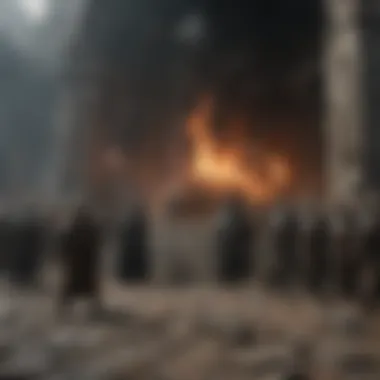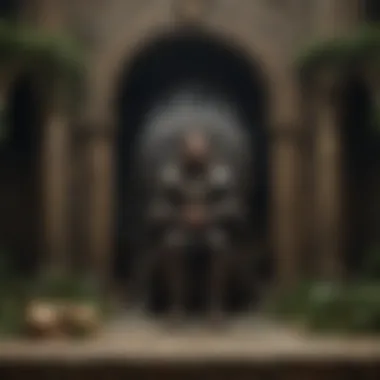Chronicles of Seven Kingdoms: Seasons of Game of Thrones


Intro
The world of Game of Thrones on HBO Max presents a sprawling, intricate tapestry, woven from myriad character arcs, intense political machinations, and a rich lore that dives deep into the history of Westeros. This series, brought to life by the creative minds behind George R.R. Martin's works, has enthralled viewers for nearly a decade, stacking up awards and capturing the imagination of both die-hard fans and casual viewers.
As we journey through the seasons, we shall explore pivotal narratives, thematic depth, and character intricacies that have shaped the realms of this universe. The tales of love, betrayal, and the fight for power are not just mere entertainment; they mirror real-world complexities and morally ambiguous decisions that resonate even today.
By the end of this exploration, readers will have a clearer understanding of what makes Game of Thrones more than just a fantasy series. The cultural impact, character journeys, and thematic richness collectively contribute to its status as a modern classic. So, grab your valyrian steel and prepare for our in-depth analysis, starting with the heartbeats of the storyline—its characters.
Foreword to Game of Thrones
Game of Thrones has become synonymous with epic storytelling, rich character dynamics, and intricate world-building. In this article, we unravel the layers that make up the series, emphasizing why understanding the show is essential for both casual viewers and die-hard fans alike.
For many, watching Game of Thrones is akin to embarking on an odyssey through a realm where every moment holds significant weight. Not just a mere television show, it’s a cultural phenomenon that has left an imprint on the landscape of popular media. Delving into the narrative complexities and season-wise breakdowns gives insight into the genius that lies behind each episode and season.
Additionally, the exploration ensures that new viewers can catch up with the series without feeling like they’ve stepped into a conversation halfway through. There's a lot to unfold, from the intricate political machinations to the deep-seated loyalty and ambition that define the narrative.
Overview of the Series
The series premiered in April 2011 and quickly garnered a massive following. Based on George R.R. Martin’s series of high-fantasy novels titled "A Song of Ice and Fire," the show was crafted by David Benioff and D.B. Weiss. Spanning eight seasons, the series shifts through various landscapes, both geographical and emotional.
The narrative kicks off in the cold, rugged North, traverses through the affluent South, and meanders into the mysterious East. Each of the four corners of this fictional universe offers distinct cultures, conflicts, and, of course, characters woven intricately into a fabric of drama that grips viewers.
This epic tale involves the constant struggle for power, where alliances form and unravel like an elaborate chess game. The show’s subplots are as compelling as the main narrative, engaging the audience through unforeseen twists and multifaceted characters.
Adaptation from Literature
The leap from pages to the screen isn't always seamless, but in the case of Game of Thrones, the adaptation has been quite notable. George R.R. Martin's lush, detailed writing infuses depth into the characters and plotlines, making it ripe for television adaptation. However, differences between the books and the show do exist, with certain characters and plot arcs being more pronounced on-screen.
"The show took its own path as it progressed, particularly in the later seasons, leading to debates among fans regarding fidelity to the source material."
The adaptation process not only involves distilling complex narratives into digestible form but also visualizing a world that fans have imagined over years. Location shoots across various countries, alongside detailed set designs, brought Westeros to life, allowing viewers to connect with the realms and the people within them. Therein lies the beauty of this adaptation, as it has made a vast universe accessible while also allowing room for interpretation and innovation.
In summary, Game of Thrones is not just a series to watch; it's a detailed tapestry of storytelling that invites viewers to immerse themselves deeply. Exploring its significance opens a door to understanding the intricate themes and character developments that unfold across its eight seasons.
Total Seasons and Episodes
Discussing the total seasons and episodes of Game of Thrones reveals not only the show’s extensive narrative but also its evolving character arcs and thematic richness. Each season serves as a building block in the intricate structure of what has come to be a cultural phenomenon. It's not just about how many episodes there are; it's about how they interlace to represent the complex dynamics of power, loyalty, and survival in Westeros.
Number of Seasons on HBO Max
Game of Thrones consists of eight seasons, which originally aired from 2011 to 2019. This duration encapsulates numerous plot lines, character explorations, and the significant world-building that made the series a standout in the realm of television. Each season varies in the depth of storylines and the pace at which the drama unfolds.
Key points about the seasons:
- Each season comprises distinct themes and climaxes, contributing to a narrative that is both engaging and thought-provoking.
- The transition from the slower, character-driven first seasons to the rapid developments in later ones highlights the shifting stakes, mirroring real-world political tension.
- Notably, the final season, while controversial among fans, epitomized the culmination of numerous character arcs and plot threads, leading to gripping resolutions and unexpected turns.
The accessibility of these eight seasons on HBO Max means viewers can immerse themselves in the entirety of the Game of Thrones experience, assembling their understanding like pieces of a puzzle. This service has made it easier for both new and returning fans to catch up and engage with the content fully.
Episode Count Analysis
The series totals 73 episodes, with various durations that reflect the increasing intensity of the unfolding story. On average, seasons one through six feature ten episodes each, while the final two seasons are abbreviated, with six episodes in the seventh and a mere six in the eighth. This reduction suggests a more concentrated approach to storytelling.
"The beauty of Game of Thrones lies in how its narrative complexity unfolds episode by episode, each serving as a microcosm of larger themes."
In examining the episode count, one notices a gradient of development:
- Early Seasons: Characters are fleshed out, and the foundations of intricate relationships are laid down. Expect more focus on political maneuvering and introductions to the rich lore of this fictional realm.
- Later Seasons: A rapid acceleration in plot progression with critical events contains twists that leave audiences both shocked and captivated. The lesser number of episodes also implies that each has to pack more emotional weight and drama, often resulting in cliffhangers and gut-wrenching revelations.
The unfolding of these episodes across seasons contributes significantly to the show’s cultural impact, further emphasizing why understanding both the total number and the breakdown of episodes is crucial for any fan looking to appreciate the craftsmanship behind Game of Thrones.
Season-by-Season Breakdown
Understanding the intricacies of each season in Game of Thrones offers a profound insight into the meticulous storytelling and character development that shapes the series. Each season paints a distinct picture, showcasing the evolution of characters and their intertwining destinies. Analyzing every season allows viewers to appreciate not only the arcs of individual characters but also the broader themes that run throughout the narrative. This breakdown is essential for discerning what makes Game of Thrones a landmark show in television history, providing a framework to explore the dynamics of power, loyalty, and survival in a world where winters can last years and seasons change swiftly.
Season One: Setting the Stage
The debut season introduces viewers to the harsh realities of Westeros and the families embroiled in its conflicts. Beginning with the Stark family, we see the values of honor and loyalty set against a treacherous backdrop. Characters like Ned Stark embody what it means to be a noble leader, while others, like the Lannisters, represent a more cunning brand of ambition. The pacing is methodical, drawing in viewers with political intrigue and the stark dichotomy of the North's coldness juxtaposed against the warmth found in familial bonds. The season concludes with a haunting sense of foreboding as the direwolf pups meet their tragic fate, setting the tone for the brutality to follow.
Season Two: Rising Tensions
In the second season, tensions flare as factions vie for the Iron Throne following the death of King Robert Baratheon. The landscape shifts dramatically as new players, like Stannis Baratheon, enter the game, revealing deeper rivalries and strategic chess moves. The audience witnesses a divergence of characters—some falling into despair while others rise, fueled by ambition or revenge. The introduction of the Battle of Blackwater is a pivotal moment, showcasing the scale of warfare and the catastrophic results of underestimating one's enemies. Overall, Season Two deepens the complexities of alliances, laying groundwork for future conflicts.
Season Three: The Red Wedding
This season is perhaps most infamous for the events surrounding the Red Wedding, an event that altered the course of the series permanently. The unexpected brutality of betrayal and the fallout from decisions made by characters like Robb Stark and Walder Frey resonate deeply with audiences, shattering assumptions about safety and loyalty. Besides this tragic event, Season Three explores themes of fate and consequence, as we also see the emergence of Daenerys Targaryen as a formidable force. Her rise from a pawn in someone else's game to a player who commands armies and dragons signals a significant shift in power dynamics.
Season Four: The Climax of Conflicts
As myriad conflicts reach a boiling point, Season Four captivates through layers of political maneuvering and personal vendettas. The battle for the North intensifies, and the consequences of previous seasons' decisions become apparent. Key moments, such as Joffrey's wedding and its aftermath, highlight the absurdity of power and the volatile nature of the ruling elite. The escalating tension culminates in the fight between trial and might, seen in the face-off between Tyrion Lannister and his accusers, which challenges notions of justice in a world rife with moral ambiguity.
Season Five: The Long Night Approaches
In this season, the shadows of the long night stretch ever closer, both literally and metaphorically. The threat of the White Walkers becomes more pronounced, pushing characters to confront existential threats beyond their personal struggles. Meanwhile, in King’s Landing, Cersei’s machinations further unravel the social fabric of the realm. The season also introduces the concept of mercy and justice, seen through the lens of Arya Stark's journey. The narrative intertwines personal growth with societal decay, creating a compelling portrait of a world on the brink of chaos.
Season Six: The Return of the Dead
Season Six showcases resurrections—both literal and symbolic—as characters revisit their pasts in life-or-death situations. Jon Snow's return integrates themes of sacrifice and duty, while Bran Stark's story delves into the weight of knowledge and its implications. This season escalates the tension leading to the long-anticipated clash of living against the dead. The revealing of powerful prophetic forces adds layers to the narrative, making viewers question destiny's role in shaping characters’ lives. It’s a season of reckoning, where loyalty is tested and true motivations come to light.
Season Seven: Unraveling Alliances
The seventh season captures the essence of desperation and shifting loyalties as heroes and foes are increasingly blurred. Characters find themselves at crossroads, often forced to collaborate with former enemies against a common threat. The complexities of alliances become starkly evident, emphasizing that in Game of Thrones, enmity can quickly morph into cooperation when survival is at stake. The season ramps up the stakes, with each passing episode bringing the audience closer to a showdown long anticipated, igniting discussions about heroism and morality.


Season Eight: Conclusive Battles
Finally, Season Eight brings viewers to the climactic battles that have been teased throughout the series. The long night culminates in an epic showdown, showcasing the dire consequences of characters’ past choices. While the narrative threads converge, many fans express their sentiments on how certain arcs conclude, particularly regarding long-standing characters. The balance between spectacle and emotional resonance in these final episodes leaves a lasting impression, raising questions about legacies and the price of power and honor. The journey concludes, marking a significant chapter in television history.
Key Themes in Game of Thrones
The themes within Game of Thrones serve as a backbone that intertwines narration with character development and audience engagement. Understanding these themes is crucial to fully grasp the complexity of the storyline and the motivations of various characters—it's not merely a tale of dragons and battles; it's a rich tapestry of human experience and motivation. Each theme explores different facets of the human condition, resonating with viewers long after the final credits have rolled. Here’s a look into the pivotal themes that emerged throughout the series.
Power and Ambition
One cannot discuss Game of Thrones without touching on the relentless pursuit of power. Characters scramble for dominance within the Seven Kingdoms, often at great personal cost. This theme serves as a grim reminder of what ambition may encourage individuals to sacrifice. For instance, we see how Cersei Lannister, driven by ambition, uses manipulation and betrayal to ascend in power structures. Her character arc reflects not only personal ambition but also societal expectations of women in positions of authority.
In a different vein, Eddard Stark's commitment to honor and loyalty shows the stark contrast between those who pursue power ruthlessly and those who embody integrity despite the dire consequences they face. Such contrasts reveal a layered understanding of ambition—one that is both destructive and aspirational, depending on the methods used to achieve it. It's this exploration that keeps audiences glued to the screen, second-guessing each character's next move.
Loyalty and Betrayal
This theme runs as a dark thread throughout Game of Thrones, often illustrating how closely those two concepts lie. Loyalty is celebrated, yet betrayal seems to be the prevailing force that drives plotlines forward. The relationship between Lord Stark and Petyr Baelish is a prime example of this duality. Initially, they share a bond; however, Baelish's ultimate betrayal reveals the fragile nature of loyalty in a world where alliances shift like sand.
Moreover, viewers are often left to ponder what allegiance entails. Characters like Theon Greyjoy and Jaime Lannister undergo profound transformations that highlight shifting loyalties amid conflicting past choices and new realities.
"In the game of thrones, you win or you die. There is no middle ground." – Cersei Lannister
The fragility of trust becomes a prevailing theme, and its exploration leads audiences to question moral integrity amidst a landscape rife with deception.
The Role of Prophecy
Prophecy in Game of Thrones adds a layer of mystique and inevitability that intertwines with the various character arcs. The ambiguous nature of prophetic visions creates a sense of uncertainty and foreshadowing that keeps viewers engaged. For example, Daenerys Targaryen embraces her destiny as the Mother of Dragons, swayed by visions that propel her forward.
However, the series invites cynicism surrounding the validity of prophecies, much like Maggy the Frog’s foretelling regarding Cersei. As characters cling to these predictions, they often find themselves ensnared, hinting at the futility of attempting to alter fate. In this way, the theme of prophecy reinforces the existential struggle within the series and hints at the cyclical nature of history within the Seven Kingdoms.
The interplay between power, loyalty, and the darker threads of prophecy adds depth to this multifaceted narrative, allowing both casual viewers and devoted fans to ponder the implications of each theme on their favorite characters. Understanding these elements broadens the appreciation of Game of Thrones, transforming it from mere entertainment into an arena for philosophical and moral exploration.
Character Development Arc
The character development arc is crucial in showcasing the narrative depth of Game of Thrones. It allows viewers to witness transformations that often embody the show's themes, such as power, betrayal, and survival. Each character is carefully woven into the fabric of their kingdom's ambitions and conflicts, presenting a human element that resonates with the audience. As viewers explore these arcs, they gain insight into the complexities of morality and loyalty within a fantastical realm.
Protagonists and Antagonists
In the realm of Westeros, protagonists and antagonists are often more than just heroes and villains; they are multifaceted individuals shaped by their choices and circumstances. Jon Snow, for instance, begins as a perceived outsider. His journey from the Wall to rightful heir to the Iron Throne is riddled with ethical dilemmas and heart-wrenching sacrifices. Similarly, Daenerys Targaryen transforms from a frightened girl into a powerful queen, though her path leads through questionable morals. On the flip side, characters like Cersei Lannister and Joffrey Baratheon embody tyranny and selfishness, creating a dynamic opposition that makes the conflicts deeply engaging. These character contrasts heighten the tension and keep audiences guessing about alliances and motivations.
"The things I do for love." - Jaime Lannister
Each character's motivations are reflected intricately in their relationships, further contributing to the rich tapestry of the narrative. For example, the friendship between Jon Snow and Samwell Tarly emphasizes loyalty and growth, while the rivalry between Cersei and Tyrion reflects the darker side of familial bonds.
Character Evolution Across Seasons


As the series progresses, the character arcs grow more intricate. The evolution of characters serves not just as a method of storytelling but also as a vehicle for thematic exploration.
Season 1 introduces many characters, yet it's in Season 5 where we see characters like Sansa Stark step into their own. Previously a pawn in others' games, she slowly transforms into a strategic player, learning the harsh lessons of survival. Meanwhile, Theon Greyjoy’s descent into the persona of Reek highlights the show's exploration of identity and trauma.
- Transformation Themes:
- Growth: Many characters start with strong ideals but are forced to evolve due to circumstances.
- Corruption: Notable characters like Stanis Baratheon become well beyond their initial moral compass as they pursue the throne.
- Redemption: Characters like Jamie Lannister, who begin as antagonists, embark on paths of self-awareness and redemption.
Each season parades a simmering conflict mirrored in the characters’ evolution, forcing the audience to confront the consequences of ambition and desire. The character development in Game of Thrones goes beyond mere storytelling; it reflects the profound impact of choices and the complex tapestries that bind individuals in a world grappling with power and loyalty.
Cultural Impact of Game of Thrones
The significance of Game of Thrones transcends its mere entertainment value; it ignited discussions that ripple throughout modern cultural discourse. At its heart, the series has become a cultural phenomena, influencing how we perceive narratives in television and even literature. In examining its broader implications, one cannot overlook its staggering ability to touch upon complex themes like power, loyalty, and morality — themes that echo in our own lives.
The show became a lens through which many fans explored societal issues and personal values. Its intricate portrayals of characters grappling with moral dilemmas prompted viewers to reflect on their own principles. Cultural relevance became evident not just in discussions around the dinner table, but also across countless media platforms where memes, theories, and analyses flourished, further solidifying its place in modern folklore.
"Game of Thrones isn't just a story; it's a reflection of our own world, a mirror showing us our societal foibles and triumphs."
Influence on Subsequent Media
The shadow of Game of Thrones looms large over contemporary media. The show's monumental success set the stage for a deluge of fantasy adaptations in both television and cinema. Big studios and streaming services saw a golden ticket in the genre, hoping to capture some of that enchanted audience engagement and critical acclaim. Series like The Witcher, His Dark Materials, and even spin-offs like House of the Dragon serve as direct descendants of what Game of Thrones achieved, fostering an appetite for complex story arcs and robust worlds.
Additionally, the impact is visible in writing styles and audience expectations. Fans now expect intricate character development and unpredictable plots as standard fare. Studios are compelled to invest in high production values, understanding that viewers will not settle for anything less when it comes to visual storytelling in fantasy.
Fan Engagement and Fandom Dynamics
The Game of Thrones fandom represents a unique tapestry of enthusiasts who, united by their love for Westeros, have created a vibrant community. Through various platforms like Reddit and social media networks, fans engage in intense discussions that often scrutinize plot points, character motivations, and deeper themes. This kind of interaction has given rise to a culture where theorizing and speculating become part of the joy of watching.
Fans have initiatives that explore the series' lore beyond the screen. They converge at conventions, participate in role-playing forums, and even craft fan fiction that expands upon the universe they adore. The Game of Thrones fandom has also adeptly used memes to communicate their interpretations of episodes, making complex themes accessible and engaging.
In essence, the dynamics of engagement have evolved remarkably. Many fans find a sense of belonging in this community, creating friendships, sharing insights, and sometimes even collaborating on projects inspired by the show.
The cultural tapestry woven by Game of Thrones illustrates not only its impact as a media entity but also its role as a social connector that bridges diverse audiences through shared narratives and discussions.
Final Thoughts
The exploration of the Game of Thrones series on HBO Max culminates in a nuanced reflection on its legacy and potential future. It’s essential to understand how this series not only influenced the television landscape but also sparked discussions that linger on in popular culture. The show, with its elaborate narratives and multifaceted characters, presented a world where every choice bore consequence, echoing the complexity of human nature itself.
Legacy of Game of Thrones
Game of Thrones, for all its twists and turns, is undeniably a cultural touchstone—a phenomenon that engaged millions. Its legacy is defined by a few key aspects:
- Narrative Depth: The series mastered the art of storytelling, weaving intricate plots that rival the complexity found in high-caliber literature. Moments like the Red Wedding remain etched in viewers' minds, showcasing Game of Thrones's capacity to subvert expectations.
- Character Complexity: Characters such as Tyrion Lannister and Daenerys Targaryen are not merely archetypes; they evolve, often in unexpected ways that prompt viewers to rethink morality and power dynamics. This depth has inspired countless hours of fan discussions and analyses, setting a high bar for character development in future series.
- Visual Innovation: Every season elevated what was possible in terms of production value. From stunning landscapes to epic battle scenes, the series didn’t just tell a story; it painted an immersive world that drew viewers into its realm. The attention to detail made Westeros feel real, breathing life into the fabled lands.
"Game of Thrones represents an era in television that pushed the boundaries of narrative and technical achievement." — Media Analyst
Such innovations reshaped how directors and producers view genre possibilities, giving rise to ambitious projects that seek to emulate this show’s grandeur.
Future of the Franchise
As we gaze into the crystal ball of what’s next for the Game of Thrones franchise, several pivotal elements emerge:
- Spin-offs and Prequels: The avenue of spin-off series presents vast possibilities to expand on various characters and histories. Titles like "House of the Dragon" show that there is still uncharted territory within this universe, allowing for deeper storytelling.
- Expansion Beyond Televison: There’s speculation around possible films or animated series that could further explore the ensemble of characters and story arcs that fans have grown to cherish. The vibrant world of Westeros offers richness that could navigate beyond traditional mediums.
- Fan Engagement: The dedicated fanbase serves as fertile ground for conversations about untold tales and historical events. Platforms such as Reddit and Facebook buzz with theories and suggestions for future content, creating an interactive realm for ongoing dialogue.



